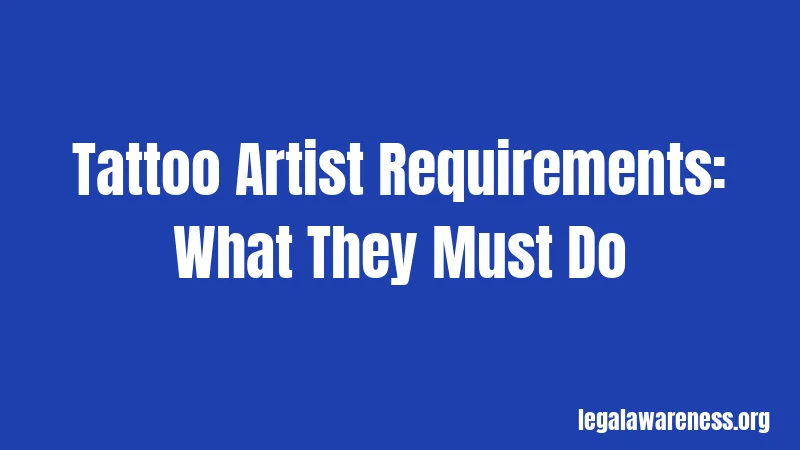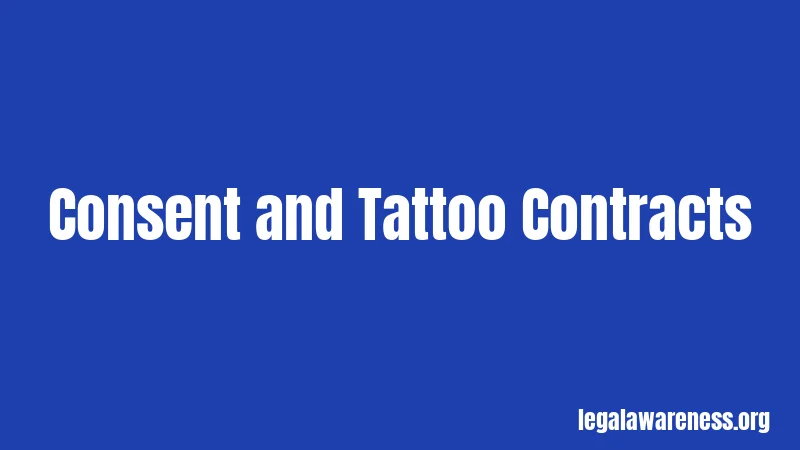Illinois Tattoo Laws (2026): What Actually Matters
Most people think tattoo laws are way stricter than they actually are. Here’s the truth: Illinois has pretty reasonable tattoo regulations. But there are definitely rules you need to know about. Getting inked without understanding the law? That’s how people get surprised later.
Let’s break down exactly what Illinois requires. Whether you’re planning your first tattoo or your tenth, this guide covers everything you need to know.
What Are Illinois Tattoo Laws?

Okay, stay with me here. Illinois tattoo laws protect both customers and artists. They make sure shops follow health standards. They set age requirements. They regulate what artists can and can’t do.
Think of it like this: these laws are basically hygiene rules with teeth. They exist because tattooing involves needles and blood. That means infections and other health risks are real concerns. Illinois takes this seriously.
The state doesn’t ban tattoos. Not at all. It just requires anyone doing the tattooing to follow specific rules. Pretty straightforward, right?
Age Requirements: The Most Important Rule
Here’s where it gets important. You must be 18 years old to get a tattoo in Illinois. No exceptions. This is non-negotiable.
If you’re under 18, a parent or guardian cannot give permission. The law doesn’t allow it. Period. Some states let parents sign off. Illinois is not one of them.
The reason? Legal consent. A minor can’t enter into a binding agreement with a tattoo artist. Once you’re 18, you can get tattooed whenever you want.
Now, what if you’re 16 or 17? You’re not entirely locked out. Some tattoo artists will tattoo minors with parental consent. But here’s the catch: it’s at the artist’s discretion. The law doesn’t require them to do it. Many reputable shops refuse on principle.
Your best bet? Wait until you’re 18. It solves all the legal confusion.
Tattoo Artist Requirements: What They Must Do

Not just anyone can stick a needle in someone’s skin and call themselves an artist. Illinois has specific rules for who can tattoo.
First, tattoo artists need to be at least 18 years old. That’s the bare minimum. Most states require this. Illinois is no different.
Here’s where it gets real: artists must be trained and experienced. The state doesn’t issue tattoo licenses, but it absolutely regulates who can work. Artists should have proper training in bloodborne pathogens and infection control. Seriously, this stuff matters.
Want to know something interesting? Most professional artists go way beyond what the law requires. They attend formal apprenticeships. They take continuing education courses. They stay updated on the latest health protocols. That’s actually the mark of a good shop.
Health and Safety Standards: The Serious Stuff
Illinois has strict health codes. They apply to every tattoo shop in the state. Honestly, this is the part most people miss.
Tattoo shops must maintain sterile equipment. Artists must follow specific cleaning procedures. They must use single-use needles and sterile ink. Cross-contamination is not allowed. Not even a little.
The shop itself matters too. It needs proper ventilation. The workspace must be clean. Blood spills require immediate cleaning with approved disinfectants. These aren’t suggestions. They’re legal requirements.
Here’s what you should do: when you visit a shop, look around. Does it look clean? Do the artists wear gloves? Are they using single-use needles? If anything feels sketchy, leave. You’re not being paranoid. You’re being smart.
Illinois also requires shops to have proper waste disposal. Needles go into approved biohazard containers. Used materials don’t just get thrown away. This protects everyone: customers, artists, and the community.
Consent and Tattoo Contracts

Hold on, this part is actually important. Before you get inked, you’re signing a consent form. This isn’t just paperwork to ignore.
The consent form says you understand the risks. Infection is possible. Allergic reactions can happen. Scarring occurs with some people. You’re basically acknowledging that tattooing has consequences.
Illinois doesn’t require a specific consent form language. But legitimate artists will have you sign something. If they don’t? That’s a red flag.
The form also protects the artist. It shows you chose to get the tattoo. You weren’t coerced. You understood what was happening. If something goes wrong later, the form documents that you agreed to the procedure.
Here’s what you need to do: read the form. Ask questions if you don’t understand something. Don’t just sign blindly. Take five minutes. It’s your body.
Disease Transmission Requirements
Okay, this gets technical, but stay with me. Illinois requires artists to follow bloodborne pathogen standards. These are CDC guidelines that prevent disease spread.
What does that mean in plain English? Artists must assume every client might have a bloodborne disease. They treat all blood as potentially dangerous. This protects everyone.
Specific requirements include proper hand washing. Artists must wear gloves during tattooing. They must change gloves between clients. They can’t tattoo with cuts or open wounds on their hands. Ever.
If the artist nicks your skin or causes bleeding (which happens sometimes), they must follow specific cleanup procedures. They use approved disinfectants. They dispose of contaminated materials properly. No shortcuts allowed.
Wondering if this applies to you? Absolutely. These rules apply to every single person who gets tattooed in Illinois. Rich or poor. Young or old. First tattoo or hundredth. Everyone gets the same protection.
Tattoo Removal and Cover-Ups
Here’s where it gets interesting. Illinois law covers getting tattoos. But what about removing them?
Tattoo removal isn’t regulated by the state the same way tattoo application is. Removal usually falls under medical procedures. Dermatologists or doctors who use laser removal follow medical regulations, not tattoo shop regulations.
This matters because if you get a bad tattoo in Illinois and want it removed? You’re working with a medical professional. Different rules apply. Different training. Different oversight.
Cover-ups (tattooing over an existing tattoo) fall under regular tattoo shop regulations. Your artist needs to follow all the same rules. Sterile equipment. Proper training. Health code compliance. Everything applies.
What Happens If Someone Breaks These Laws?
Let’s talk about penalties. Not trying to scare you, but this stuff is real.
If a tattoo shop violates health codes, they can be shut down. The Department of Public Health can issue citations. The shop can face significant fines. This is literally how they shut down dangerous operations.
Individual artists who violate laws can face criminal charges. We’re talking misdemeanor offenses. Fines up to a few hundred dollars. Possible jail time depending on how serious the violation is.
Think of it like a health violation at a restaurant. The violations matter. The consequences can be serious. That’s why legitimate shops take this so seriously.
If you get tattooed at an illegal shop and contract an infection? You have grounds for legal action. You could sue for medical expenses, pain and suffering. The shop’s negligence would be documented.
Here’s what you should know: tattooing minors without following all requirements can result in criminal charges. We’re talking serious consequences for artists who break this law. This is why most shops absolutely verify your age.
Recent Changes and Updates
Illinois tattoo laws have remained fairly stable in recent years. The core regulations haven’t changed dramatically since the 2000s. That’s actually good news for you.
What has changed is enforcement. Local health departments are increasingly cracking down on illegal shops. More tattoo shops now carry liability insurance. Professional standards have gone up across the board.
One thing worth noting: during the COVID-19 pandemic, some regulations temporarily shifted. But as of 2026, those have been rolled back. Standard health codes apply again.
The message from the state is clear. Follow the rules or face consequences. Most reputable shops have nothing to worry about. They’re already compliant.
How to Find a Legal, Safe Tattoo Shop
Okay, practical time. Here’s exactly what you should do.
First, look for shops that display their health permits. These should be visible. If you can’t find them, ask. If the shop can’t produce them, leave immediately.
Second, ask about the artist’s training. Real artists can tell you about their apprenticeship. They know bloodborne pathogen protocols. They can explain their sterilization process. If they can’t or won’t, that’s a problem.
Third, check online reviews. Look specifically for mentions of cleanliness and professionalism. Ignore complaints about pain or design choices. Those are subjective. Focus on reviews mentioning hygiene and health standards.
Fourth, trust your gut. Does the shop feel clean? Do the artists seem knowledgeable? Are they willing to answer questions? You should feel comfortable and confident. If you don’t, find someone else.
Finally, ask to see the autoclave. This is the machine that sterilizes equipment. If an artist seems annoyed by this question, that’s weird. Professional shops expect and welcome this question.
Special Situations: Tattoos and Specific Body Locations
Wondering if certain tattoos are illegal? Mostly no. Illinois doesn’t ban specific designs or locations.
You can legally get face tattoos. Neck tattoos are fine. Hand tattoos? No problem. Intimate area tattoos? Illinois doesn’t prohibit them.
The artist might refuse. Many shops have their own policies. Some artists won’t tattoo hands, necks, or faces. They might believe it affects employability. That’s their choice. But it’s not a legal requirement.
One exception exists: visible gang tattoos. That’s… complicated. But that’s not really a tattoo law thing. That’s organized crime law stuff. If you’re getting tattooed, this probably doesn’t apply to you.
Frequently Asked Questions
Can I get a tattoo at 17 with parental permission? Not legally required. Some artists might do it at their discretion. Most reputable shops refuse. Your safest option is waiting until you’re 18.
What if my tattoo gets infected? See a doctor immediately. Get the infection treated medically. After you’re healed, you can consider legal action against the shop if you have evidence they violated health codes.
Do I need a test for bloodborne diseases before getting tattooed? Illinois doesn’t legally require it. But if you know you have a bloodborne disease, it’s ethical to tell your artist. They’ll take extra precautions.
Can an artist refuse to tattoo me? Absolutely. Artists can refuse for any reason. It’s their business. If they’re uncomfortable, you find someone else. No big deal.
Is it illegal to tattoo someone at home in Illinois? It’s not explicitly illegal. But if the person doing the tattooing violates health codes (which is likely), that’s illegal. Your health insurance might not cover complications from home tattoos. This is risky.
What’s the difference between licensed and unlicensed artists? Illinois doesn’t have a formal tattoo artist licensing system. “Licensed” and “unlicensed” aren’t really terms the state uses. What matters is whether they follow health codes. Check for health department permits, not artist licenses.
Final Thoughts
Illinois tattoo laws exist for one reason: protecting your health. They’re not meant to stop you from getting tattooed. They’re meant to make sure it happens safely.
The good news? Illinois has reasonable regulations. You’re 18 or older. You walk into a legitimate shop. You’re basically good to go.
The better news? Most reputable tattoo artists exceed legal requirements. They’re professionals who care about their craft and your safety. Finding a good shop isn’t hard if you know what to look for.
So here’s your action plan: pick a reputable artist. Ask questions about their training and processes. Check their health permits. Read and understand your consent form. Then get that tattoo you’ve been thinking about.
Stay informed. Stay safe. And when in doubt, ask your artist or contact your local health department.
References
Illinois Department of Public Health Tattoo Regulations
CDC Guidelines for Bloodborne Pathogen Prevention
Illinois Piercing and Tattoo Association
American Society of Dermatologists – Tattoo Health Information
